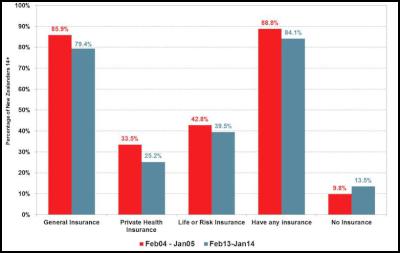Going undercover: more Kiwis running the risk with falling rates of Health, Home, Car and Life Insurance
Almost 1 in 7 Kiwis (13.5%) now have no insurance whatsoever, up from fewer than 1 in 10 (9.8%) in 2005, the latest data from Roy Morgan Research shows.
The proportion of New Zealanders covered by all types of insurance has been in steady decline. In the 12 months to January 2005, 85.9% had General Insurance such as Home, Vehicle or other Property; as of January this year, it is 79.4%. The proportion with Life or Risk Insurance is down from 42.8% to 39.5%.
But Private Health Insurance has suffered the biggest proportional decline over the period, from 1 in 3 Kiwis covered in 2005 to just 1 in 4 at the start of 2014.
% New Zealanders with each type of Insurance

Click for big version.
Source: Roy Morgan Research Single Source: Feb 2004 – Jan 2005 (n = 12,766) and Feb 2013 – Jan 2014 (n = 12,480). A small proportion of people can’t say if they have insurance.
Over the period, average annual Private Health Insurance costs have ballooned by over 50%, from $1136 to $1726, costing the average policy-holder almost $600 more per year.
The rising average dollar expenditure can be largely attributed to members dropping out altogether when policy costs become too high. In 2005, 782,000 Kiwis had health insurance costing them under $2000 per year; today, it’s 516,000. But while the number of Kiwis who spend over $2000 per year on private health insurance has almost doubled from 115,000 to 222,000 in the period, this still equates to around 159,000 leaving the system.
Private Health Insurance coverage rates have declined across all groups, most dramatically among 25-34 year-olds, with only around 1 in 5 now covered compared with 1 in 3 in 2005. The proportion of 50-64 year olds covered has also declined sharply, from just under half in 2005 to 37% now.
Overall, 84.1% of New Zealanders have some kind of insurance, down from 88.8% in 2005.
Pip Elliott,
General Manager, Roy Morgan Research NZ, says:
“The
rate of all forms of insurance coverage among New Zealanders
has declined over the past decade, particularly in the area
of private health. Consequently, Kiwis have become
increasingly reliant on the national public health
system.
“Right now, it’s a vicious cycle: rising private health insurance policy prices lead to fewer participants (and a concentration of them with higher-cost medical needs), which in turn leads to higher costs again.
“Two thirds of Kiwis (66.5%) with Private Health Insurance are with one of the top three providers: Southern Cross Healthcare (including Aetna), Tower or Sovereign. Although the market share for Southern Cross has declined from 52.7% since 2005, it still remains far and away the largest provider, with 48.4% of the market.
“Around 4 in 10 of those with private health insurance obtained it through their employer, and another 4 in 10 through an insurance broker, institutionally affiliated or independent financial advisor or the insurance company directly.
“Australians are slightly less likely than New Zealanders to have General Insurance (74.6% compared with our 79.4%) but are overwhelmingly more likely to have Private Health Insurance (40.6% vs our 25.2%).”
Roy
Morgan Research
Roy Morgan Research is Australia’s
best known and longest established market research and
public opinion survey company. Roy Morgan Single Source is
thorough, accurate, and provides comprehensive, directly
applicable information about current and future customers.
It is unique in that it directs all the questions to each
individual from a base survey sample of around 55,000
interviews in Australia and 15,000 interviews in New Zealand
annually - the largest Single Source databases in the world.
The questions asked relate to lifestyle and attitudes, media
consumption habits (including TV, radio, newspapers,
magazines, cinema, catalogues, pay TV and the Internet),
brand and product usage, purchase intentions, retail
visitations, service provider preferences, financial
information and recreation and leisure activities. This lead
product is supported by a nationally networked,
consultancy-orientated market research capability.
ENDS




 The Reserve Bank of New Zealand: RBNZ Supports Release Of Police’s National Risk Assessment
The Reserve Bank of New Zealand: RBNZ Supports Release Of Police’s National Risk Assessment Bill Bennett: Download Weekly - ComCom Recommends Removing Rural Copper Regulations
Bill Bennett: Download Weekly - ComCom Recommends Removing Rural Copper Regulations Hugh Grant: Why Pay Equity Software Is Essential For A Strong Employee Value Proposition
Hugh Grant: Why Pay Equity Software Is Essential For A Strong Employee Value Proposition Electricity Authority: Electricity Authority Acts Quickly To Strengthen Security Of Electricity Supply Ahead Of Winter
Electricity Authority: Electricity Authority Acts Quickly To Strengthen Security Of Electricity Supply Ahead Of Winter School Lunch Collective: Compass Group New Zealand To Acquire Libelle Group Securing Healthy School Lunch Programme
School Lunch Collective: Compass Group New Zealand To Acquire Libelle Group Securing Healthy School Lunch Programme PSA: PPPs Pose Risks To New Zealand Workers
PSA: PPPs Pose Risks To New Zealand Workers



